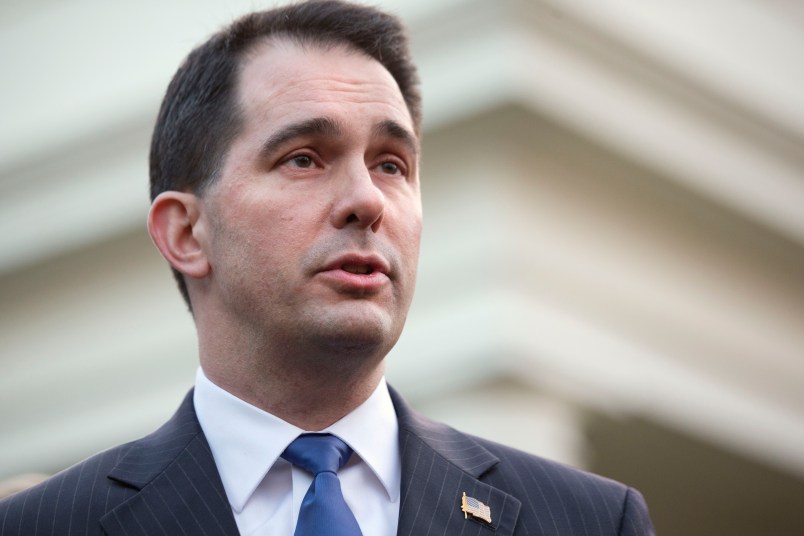Last week thousands of emails from Scott Walker and his staff were released as the result of one of two lengthy investigations into Walker’s political operation. We’ve learned a lot about how his team does business, but so far there’s no smoking gun proving Walker was directly involved in misconduct.
The investigation into Walker’s closest advisors isn’t getting the attention that’s going to Chris Christie’s controversies, and it isn’t as easy to understand as the grubby corruption surrounding former Virginia Gov. Bob McDonnell. Indeed, even though Walker’s talking like a guy who really wants this to go away, the Beltway press seems happy to oblige.
We shouldn’t just let it drop. The main thing to come out of these emails is a fuller picture of who Scott Walker really is, and how he operates.
These emails don’t reveal that one taxpayer-funded staffer returned a few campaign phone calls on their work phone. They show a pervasive, intentional blurring of the lines between governing and the campaign. His “inner circle” of closest advisors were constantly engaged in campaign activity on county time, using a secret email system and router to cover their tracks. Six of his aides faced criminal charges as a result.
This wasn’t some sort of accident, and it wasn’t something Walker had no idea about whatsoever. It’s an indication of his greater interest in scoring right-wing points than in actual governing.
(The secret email system apparently wasn’t all for doing political work on government time; the staff Walker surrounded himself with used the same system to swap tasteless right-wing jokes that would get an eye-roll at a CPAC happy hour.)
Still, Walker has managed to stay somewhat clean of the misconduct his closest advisors carried out on his behalf (though another investigation is underway into similar allegations about his recall campaign in 2012).
However, you don’t need a smoking gun email to know who Scott Walker is. You just need to look at his actual record in office.
Like so many Republicans in 2010, Scott Walker won thanks to frustration about the economy. The image he presented was a common-sense guy who just wanted to get the economy back on track — accompanied with a promise to add 250,000 jobs in his first term.
He’s nowhere close to keeping that job-creation promise, and what growth he has taken credit for mostly occurred before he was even inaugurated.
But putting people to work was never the point. When Walker got into office, he governed as what he really is — a right-wing ideologue whose career is aimed at entrenching right-wing power.
Walker’s top priorities are basically unrelated to his promise to add jobs. Instead, he and his allies in the legislature have concentrated on right-wing dream projects like limiting access to abortion and defunding Planned Parenthood. They’ve resisted both federal infrastructure money and any effort to make the Affordable Care Act work for Wisconsin. And they’ve moved to maintain their hold on the state government in the longer term through redistricting and restrictions on the right to vote.
The most obvious evidence of Walker’s interest in notching right-wing ideological wins that consolidate his power, rather than creating good jobs, is the union-busting law he pushed through shortly after his inauguration. Breaking unions’ ability to represent workers in states where they’ve traditionally been strong is the driving force behind a lot of conservative politics–you can see these efforts underway in Indiana, Michigan, Missouri and of course Wisconsin.The “devastating effect” Walker’s policies have had on unions is a feature, not a bug. The goal is a redistribution of power in the state–upwards.
This isn’t happening for the good of the state – you just have to look across the border to Minnesota to see a state economy getting better results.
These power grabs–blocking voting rights, restricting abortion and busting unions–aren’t the reason Walker won, but they’re the reason he’s in politics. And they’re his calling card as he looks toward Republican primaries in 2016, even if the John Doe investigations threaten to undermine him.
You don’t need 25,000 pages of emails to know who Scott Walker is. You just have to look at how he’s governed.
Seth D. Michaels is a freelance writer in Washington, D.C. He’s on Twitter as @sethdmichaels.






